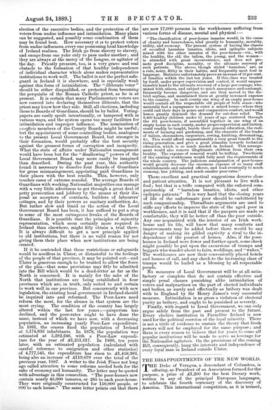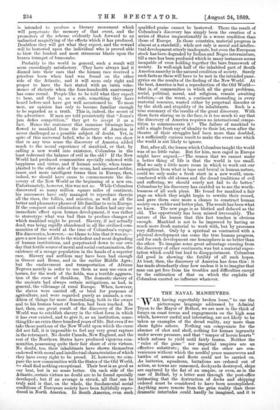THE DISAPPOINTMENTS OF THE NEW WORLD.
THE Duke of Veragua, a descendant of Columbus, is offering, as President of an Association formed for the purpose, a prize of £1,200 for the best literary work, written in any of the principal European languages, to celebrate the fourth centenary of the discovery of America. This international competition, as it is termed, is intended to produce a literary monument which will perpetuate the memory of that event, and the promoters of the scheme evidently look forward to an unlimited magnifying of the effects which it has produced. Doubtless they will get what they expect, and the reward will be bestowed upon the individual who is proved able to blow the loudest and most strenuous blasts upon the brazen trumpet of buncombe.
Probably to the world in general, such a result will seem exceedingly satisfactory. They have always had it dinned into their ears that the human race received a priceless boon when land was found on the other side of the Atlantic, and it will seem only right and proper to have the fact stated with an extra vehe- mence of rhetorib when the four-hundredth anniversary has come round. People like to be told what they expect to hear, and that is, as a rule, something they have heard before and have got well accustomed to. To most men, an opinion has only to become familiar enough to be regarded as a truth. This is, indeed, the secret of the advertiser. If men are told persistently that "Jones's jam defies competition," they get to accept it as a fact. Hence the statement that immense blessings have flowed to mankind from the discovery of America is never challenged as a possible subject of doubt. Yet, in spite of this universal belief, who is there who can show that in any true sense the discovery of America added much to the moral experience of mankind, or that, by calling a new world into existence, Columbus in the least redressed the balance of evil in the old ? If the New World had produced communities specially endowed with happiness and virtue, and if human society, when trans- planted to the other side of the ocean, had assumed nobler, saner, and more intelligent forms than in Europe, then, indeed, we should have cause to commemorate the dis- covery of the New World as the beginning of a new era. Unfortunately, however, this was not so. While Columbus discovered so many million square miles of continent, his successors have only managed to reproduce therein all the vices, the follies, and miseries, as well as all the better and pleasanter phases of life familiar to us in Europe. If the conquest and colonisation of the Indies had any one immediate effect upon human development, it was rather to stereotype what was bad than to produce changes of which mankind might be proud. Slavery, if not actually dead, was being rapidly abandoned in all the civilised com- munities of the world at the time of Columbus's voyage. His discoveries, however,—no blame to him that it was so,— gave a new lease of life to the wickedest and most degrading of human institutions, and perpetuated down to our own day that fertile source of moral and social contamination, the existence of a savage population in the hands of a superior race. Slavery and serfdom may have been bad enough in Greece and Rome, and in the earlier Middle Ages ; but the enslavement and transportation of African Negroes merely in order to use them as men use oxen or horses, for the work of the fields, was a terrible aggrava- tion of the curse of thraldom. The domestic slavery of the ancients had always certain mitigations, as had, in general, the villeinage of rural Europe. When, however, the slaves were carried off, or bred for purposes of agriculture, and were regarded purely as animals, a con- dition of things far more demoralising, both to the owner and to his human beast of burden, had been reached. In fact, then, one great result of the discovery of the New World was to establish slavery in the vilest form in which it has ever existed, and to give it, as an institution, some- thing like an extra three hundred years of life. But even if we take those portions of the New World upon which the curse did not fall, it is impossible to feel any very great rapture in the retrospect. No doubt Canada, New England, and the rest of the Northern States have produced vigorous com- munities, possessing quite their fair share of civic virtues. No doubt, too, their inhabitants have shown themselves endowed with moral and intellectual characteristics of which they have every right to be proud. If, however, we com- pare the new communities with the States of the Old World, we shall find nothing exceptional. Their best is as good as our best, but in no sense better. On each side of the Atlantic, certain virtues no doubt are to be found specially developed; but if an average is struck, all that can be truly said is that, on the whole, the fundamental social conditions of European society have been faithfully repro- duced in North America. In South America, even such qualified praise cannot be bestowed. There the result of Columbus's discovery has simply been the creation of a series of States unquestionably in a worse condition than those of Europe. In those countries, material progress is almost at a standstill; while not only is moral and intellec- tual development utterly inadequate, but even the European stock has been degraded by Indian and Negro intermixture, till a race has been produced which in many instances seems incapable of even holding together the bare framework of society. In well-nigh half of the inhabited part of South America anarchy is the natural condition of society. Surely such facts as these will have to be met in the intended pane- gyrics on the results of the finding of the New World. At the best, America is but a reproduction of the Old World— that is, of communities in which all the great problems, social, political, moral, and religious, remain awaiting solution,—at the worst, a continent abounding in every material resource, wasted either by perpetual disorder or by the sloth and stupidity of its inhabitants. Such is a true summary of the results of the great discovery. With these facts staring us in the face, is it too much to say that the discovery of America requires no international compe- tition to commemorate it ? The failure of mankind to add a single fresh ray of ideality to their lot, even after the theatre of their struggles had been more than doubled, is a sufficiently curious result to make the event one which the world is not likely to ignore.
But, after all, the lesson which Columbus taught the world was of no little value. But for him, men caged in Europe might have argued,—' The reason that we cannot make a better thing of life is that the world is too small. Had we only a little more room in which to work out our redemption from what is base and brutal in human nature, could we only make a fresh start in a new world, unen- cumbered with old abuses and the dread traditions of evil and suffering, we should surely not fail to do better.' Columbus by his discovery has enabled us to see the worth- lessness of all such pleas. He found for mankind a fair page on which they might begin to rewrite their record, and gave them once more a chance to construct human society on a nobler and better plan. The result has been what we know. The new page is as blotted and defaced as the old. The opportunity has been missed irrevocably. The nature of the lesson that this fact teaches is obvious enough. Mankind is not to be improved by having so much more fresh material to work with, but by processes very different. Only by a spiritual as contrasted with a physical development can come the true human progress, and for such development one hemisphere is no better than the other. To imagine some great advantage ensuing from the discovery of other continents, was but a material expec- tation which could but lead to disappointment. Columbus did good in showing the futility of all such hopes. At least, then, the discovery of America has done this : it has made abundantly clear how useless it is to imagine that man can get free from his troubles and difficulties except by the cultivation of that on which the exploits of Columbus exerted no influence whatever.



































 Previous page
Previous page